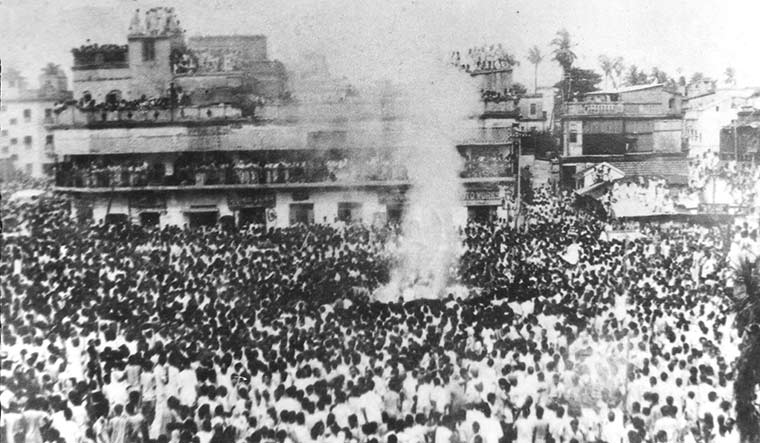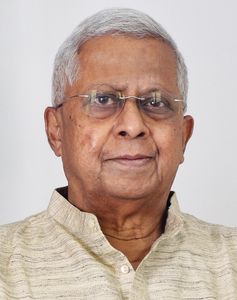Was Mookerjee a secularist?
Secularism is a much abused word and I am not going to use it. I am giving you examples. It was Mookerjee who brought Hassan Suhrawardy—elder brother of the first Pakistani prime minister Huseyn Shaheed Suhrawardy, who was blamed for the Calcutta and Noakhali riots—to Calcutta University as professor of fine arts. Hassan, back then, was a professor of English in St Petersburg, Russia, and Mookerjee, as vice chancellor, wanted him to fill the post vacated by Rabindranath Tagore’s cousin Abanindranath. The famous Bengali poet Jasimuddin was able to complete his studies only because Mookerjee arranged a scholarship for him. Yet, Mookerjee got a raw deal ultimately as he was branded a communalist.
Is it not wrong to say that Mookerjee did not support the Quit India movement?
He did not support the Quit India movement. But leaders like B.R. Ambedkar and C. Rajagopalachari, too, were not in favour of the movement. What perhaps gave you the impression that Mookerjee supported the movement was a letter he wrote to viceroy Lord Linlithgow, acknowledging the patriotic sentiment of the movement. He opposed the atrocities unleashed on Congress workers. He wanted the British to quit, but he realised that there was no one to whom they could have handed over power.
Later in 1947, India saw the problems associated with the transfer of power. The country had to be partitioned. The Quit India movement had a dangerous effect on Bengal as Muslims and communists had a field day, (as) Congressmen (were) in jail. They propagated their views openly as a result of that.
But Mookerjee resigned from the Bengal cabinet because of the oppression against Congress workers.
I do not think that was the only reason. A tsunami had hit Midnapore, causing huge destruction. But Mookerjee was not allowed to visit the place. As the British government failed to undertake a proper rescue operation, he took on the governor.
How do you assess Mookerjee’s relations with Subhas Chandra Bose?
Mookerjee had practically no interaction with Subash Bose except during the corporation election in 1940. Personally, I feel that a leader of Bose’s stature should not have stooped so low to interfere in corporation politics. Earlier there was some talk of a coalition between the Hindu Mahasabha and the Congress for the corporation election, but it did not work out. Bose threatened Mookerjee that he would break his organisation, by force if needed. But their paths crossed barely for a year. Bose left India in January 1941 and never returned.
What about Sarat Chandra Bose?
When Mountbatten became viceroy in 1947, the Congress accepted the partition proposal. Mookerjee categorically said that Hindus could not be a part of Pakistan and that if India had to be partitioned, Bengal should also be partitioned. We, Bengali Hindus, are all grateful to him for this. We would have been Pakistani citizens but for him and would have been killed in state-sponsored pogroms. Muhammad Ali Jinnah, Suhrawardy and Liaquat Ali Khan did not want to give up Calcutta, which was then India’s number one city. As they saw Mookerjee winning, floated the idea of a united, independent, sovereign Bengal and they managed to get Sarat Bose on their side. But by that time, Bose was a politically discredited person.
So, if the Congress had accepted the partition proposal, why is Mookerjee alone being hailed as the founder of West Bengal?
This is primarily because Mookerjee was then the undisputed leader of Bengal on the issue of partition. The Congress did not have a leader of Mookerjee’s stature after the departure of Subhas Bose. Mookerjee was the man who initiated the ‘Save Bengal, save Hindu’movement and he continued with it till the end.
Why did Calcutta forget him?
It is a canard floated by the communists that he was not popular in Calcutta. When he became minister in Nehru’s cabinet, the city cheered him and there was a long queue from Howrah station till the Howrah bridge to receive him. After he resigned, too, there was a huge gathering in Calcutta to receive him. There were reasons behind it. Chittaranjan Locomotive Works and Damodar Valley Corporation were his contributions as cabinet minister.
After his death, although his coffin reached the Calcutta airport in the middle of the night, a huge crowd had assembled to pay their last respects. It took seven hours to complete the journey from the airport to his house, which normally takes just 45 minutes.
Was Mookerjee a mass leader?
Of course. Otherwise how could he have swayed the people of Bengal on the issue of partition and the entire nation over Kashmir? The whole country erupted when he took major political steps, first against the British and then against the Congress government in free India. There was a similar reaction after his death as well. People cutting across party lines paid him moving tributes.
His death remains mysterious.
What is really mysterious is that there was no inquiry after his death. His death in custody came soon after he was heralded by The Illustrated Weekly of India as a likely successor to Nehru, preferred over prominent leaders like Jayaprakash Narayan in a survey. He died under questionable circumstances. There had been five inquiries about Netaji’s disappearance. Gandhi’s assassination was also thoroughly investigated.
Why was Mookerjee’s death not investigated?
Nehru stonewalled it with his brute majority despite requests by senior leaders like Nirmal Chatterjee and H.V. Kamath. Nehru and home minister K.N. Katju prevented it.
Why non-Congress governments, too, chose not to investigate?
The 1977 Janata Party government was totally confused. However, I agree that the Vajpayee government should have set up an inquiry commission. That argument is valid for the present government as well, but most of the evidence (is) probably lost by now.



